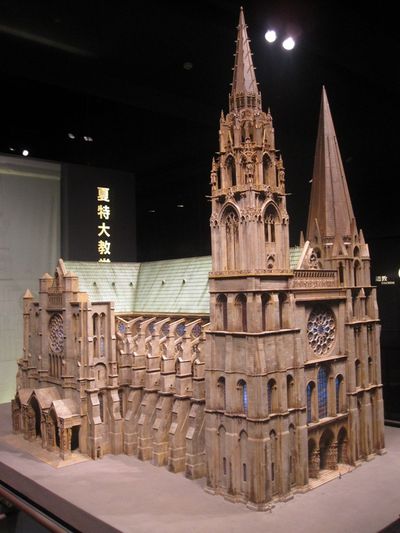Chartres Cathedral
The front of the cathedral at Chartres.
Chartres Cathedral (Cathédrale Notre-Dame de Chartres[1]) is a great cathedral in Chartres, France. It was built between 1193 and 1250 in the Gothic architectural style over the burned ruins of an ongoing project to modernize a previous wood-roofed Romanesque church.
The church was the center of Mariolatry in France as it housed a gift acquired from Constantinople by Charles the Bald presumed to be the tunic which was worn by Virgin Mary at Jesus's nativity. The new facade and the Romanesque choir survived the fire that also befell on a large part of the town on June 10, 1194, and along with them the tunic, which was preserved in the crypt below the choir. With the priests' explanation to the townspeople that Mary wished to be restored in even greater magnificence, constructions started anew right away to fulfill her wish.
The limit placed on the nave's length by the fault that occurs to the east was made up for in height. In its transformation to the gothic style, the cathedral was given a new twin-tower facade with a large rose window installed above the three lancets of the new vestibule built before the fire, and an outer ambulatory reduced the depth of the Romanesque radiating chapels. By 1220 Our Lady of Chartres was ready for consecration.

A detailed model of the Chartres Cathedral at the Museum of World Religion in Taipei.
- ↑ Cathédrale Notre-Dame de Chartres is different from Cathédrale Notre-Dame de Paris, which is colloquially known as Notre Dame de Paris